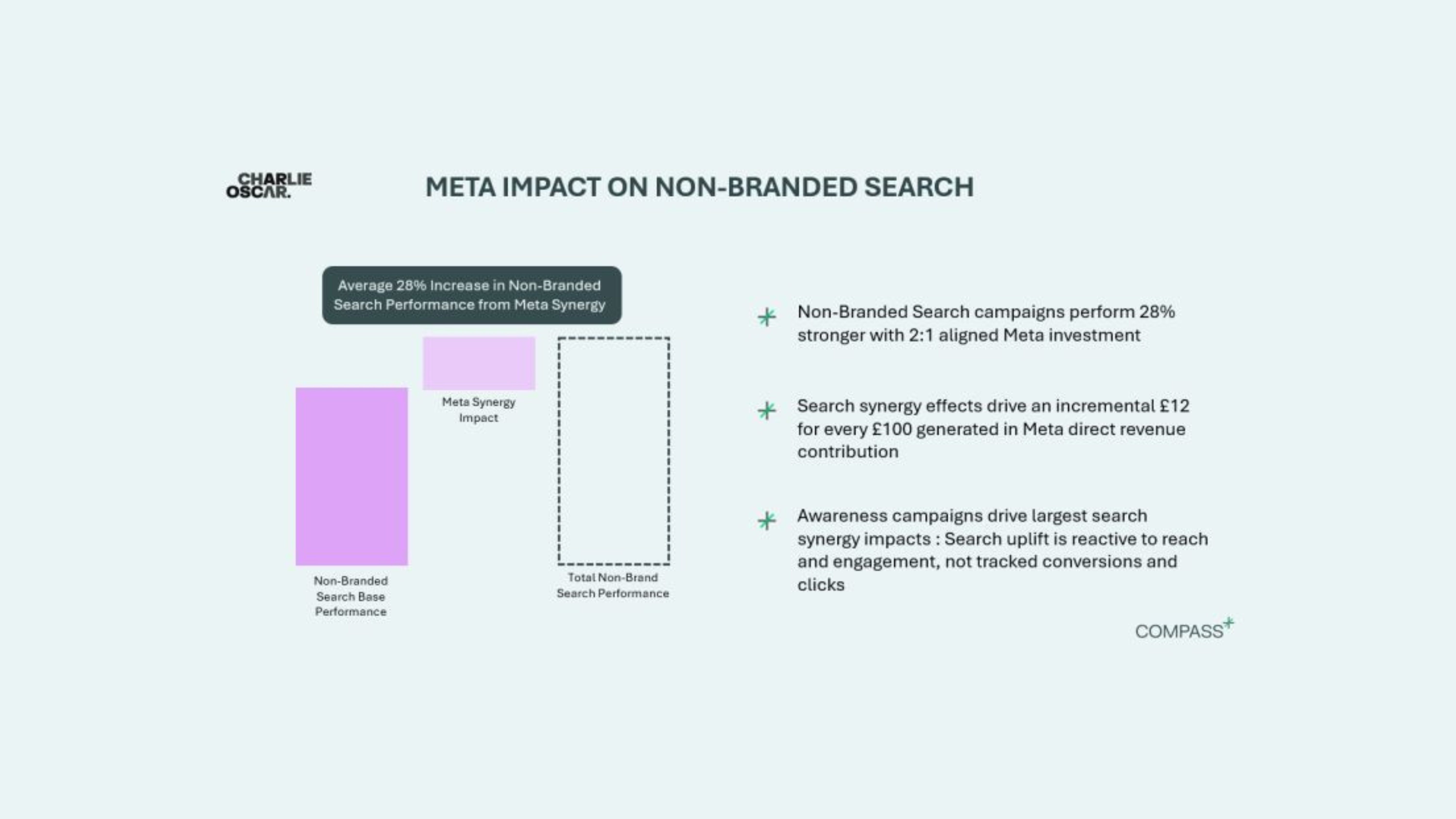
How much impact does Meta have on Search? And what can we actually do about it?
We talk about channel synergy, and you probably see it in your day to day campaign results.
If you turn off your paid social campaigns then paid search CPA goes up.
So, does it actually factor into your day-to-day optimisations?
These synergy effect are a crucial part of what drives marketing performance. Most attribution methods (especially anything click based) assumes that marketing channels act independently:
“𝘛𝘩𝘢𝘵 𝘤𝘰𝘯𝘷𝘦𝘳𝘴𝘪𝘰𝘯 𝘤𝘢𝘮𝘦 𝘧𝘳𝘰𝘮 𝘴𝘦𝘢𝘳𝘤𝘩”
𝗕𝘂𝘁 𝗺𝗮𝗿𝗸𝗲𝘁𝗶𝗻𝗴 𝗰𝗵𝗮𝗻𝗻𝗲𝗹𝘀 𝗵𝗮𝘃𝗲 𝗻𝗲𝘃𝗲𝗿 𝗯𝗲𝗲𝗻 𝗶𝗻𝗱𝗲𝗽𝗲𝗻𝗱𝗲𝗻𝘁 𝗼𝗳 𝗲𝗮𝗰𝗵 𝗼𝘁𝗵𝗲𝗿.
How customers act in search is dependent on what you do in other marketing channels (and a number of external factors such as seasonality, competitors, market conditions etc.)
𝗧𝗵𝗮𝘁 𝗶𝘀 𝘁𝗿𝘂𝗲 𝗶𝗻 𝗯𝗼𝘁𝗵 𝗯𝗿𝗮𝗻𝗱𝗲𝗱 𝗮𝗻𝗱 𝗻𝗼𝗻-𝗯𝗿𝗮𝗻𝗱𝗲𝗱 𝘀𝗲𝗮𝗿𝗰𝗵 𝗰𝗮𝗺𝗽𝗮𝗶𝗴𝗻𝘀.
Here’s how we measured it
Our COmpass models measure these impacts as standard across every campaign. All of our models build these synergy impacts into both the structure and the outputs of the models.
This allows us to see how strong these impacts are, how they change over time, and which campaigns/creatives/tactics generate the strongest search uplifts.
What patterns we actually saw
Every brand will see different behaviours but there are common themes in these synergy relationships:
-
On average 𝗡𝗼𝗻 𝗕𝗿𝗮𝗻𝗱𝗲𝗱 𝗦𝗲𝗮𝗿𝗰𝗵 𝗰𝗮𝗺𝗽𝗮𝗶𝗴𝗻𝘀 𝗽𝗲𝗿𝗳𝗼𝗿𝗺 𝟮𝟴% 𝘀𝘁𝗿𝗼𝗻𝗴𝗲𝗿 as a result of Meta campaign investment (at a 2:1 investment ratio)
-
Search synergy impact drives an incremental £𝟭𝟮 𝗶𝗻 𝗿𝗲𝘃𝗲𝗻𝘂𝗲 𝘁𝗵𝗿𝗼𝘂𝗴𝗵 𝗣𝗮𝗶𝗱 𝗦𝗲𝗮𝗿𝗰𝗵 𝘀𝘆𝗻𝗲𝗿𝗴𝘆 𝗳𝗼𝗿 𝗲𝘃𝗲𝗿𝘆 £𝟭𝟬𝟬 generated in Meta direct revenue contribution
-
𝗔𝘄𝗮𝗿𝗲𝗻𝗲𝘀𝘀 𝗰𝗮𝗺𝗽𝗮𝗶𝗴𝗻𝘀 𝗱𝗿𝗶𝘃𝗲 𝗹𝗮𝗿𝗴𝗲𝘀𝘁 𝘀𝗲𝗮𝗿𝗰𝗵 𝘀𝘆𝗻𝗲𝗿𝗴𝘆 𝗶𝗺𝗽𝗮𝗰𝘁𝘀: Meta uplift is most reactive to reach and engagement, and least reactive to clicks and tracked conversions. The search synergy is driven through putting strong engaging content in front of the right audiences.
(Edit: performance uplift is measured on improvement in CPA as measured via MMM)
What we do differently because of it
Building these effects into our daily, weekly and monthly optimisations allow us to make 𝗱𝗲𝗰𝗶𝘀𝗶𝗼𝗻𝘀 𝗯𝗮𝘀𝗲𝗱 𝗼𝗻 𝘁𝗵𝗲 𝗳𝘂𝗹𝗹 𝗶𝗻𝗰𝗿𝗲𝗺𝗲𝗻𝘁𝗮𝗹 𝗶𝗺𝗽𝗮𝗰𝘁 𝗼𝗳 𝗲𝗮𝗰𝗵 𝗰𝗵𝗮𝗻𝗻𝗲𝗹, rather than the short term navigational impact.

